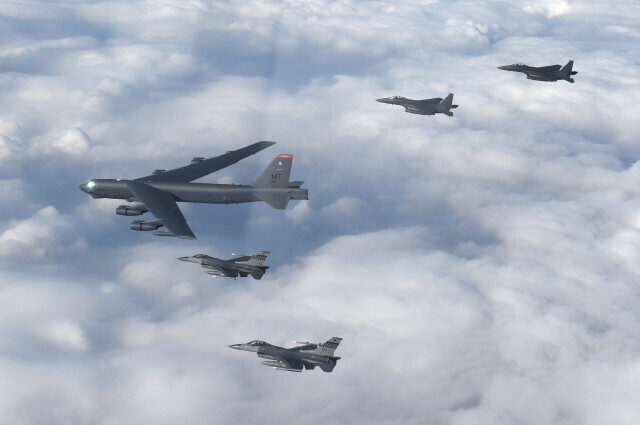hankyoreh
Links to other country sites 다른 나라 사이트 링크
CSIS advises US to prepare for possible redeployment of tactical nukes to S. Korea

A Washington think tank is advising the US government to review military exercises in preparation for the redeployment of tactical nuclear weapons in South Korea. The think tank also advised the US to consider partial sanctions relief for North Korea on the condition that it ceases its nuclear weapons and missile tests.
The Center for Strategic and International Studies (CSIS) commission on the Korean Peninsula released a report titled “Recommendations on North Korea Policy and Extended Deterrence” on Wednesday (local time), in which it called for the US to reconsider exercises that “lay pre-decisional groundwork for possible redeployment of U.S. low-yield nuclear weapons.”
The report stated that the redeployment of tactical nuclear weapons should only be considered when existing extended deterrence measures, such as the deployment of submarine-launched nuclear missiles or the creation of a joint South Korea-US nuclear planning framework, are exhausted. It also emphasized that “the timeline and scope of weapons, such as low-yield nuclear SLCMs [submarine-launched cruise missiles] or gravity bombs, should be left deliberately ambiguous.”
Specifically, the report noted the environmental impact of the redeployment of tactical nuclear weapons and the necessary possible locations for facilities for storage, certifying transportation means such as US F-16 and F-35 fighter jets, and building storage facilities that may take two to three years to complete.
“This type of pre-decisional preparatory framework would signal commitment to the allies and resolve to North Korea while not yet crossing the proliferation threshold,” the report read.
The report went on to suggest that a framework for joint nuclear planning should be created, saying that it would be similar to a NATO planning group for nuclear weapons use. The report suggested that the US “explore the prospects for multilateral nuclear umbrella guarantees by engaging other like-minded partners, such as the United Kingdom and France,” and that the US, South Korea, and Japan should “look for ways to trilateralize operational activity that involves strategic assets, such as along the lines of Blue Lightning missions.” If necessary, South Korea could station some of its assets in US bases, such as that in Guam.
These recommendations can be seen as an effort to find a compromise between the pros and cons of the redeployment of tactical nuclear weapons in South Korea.
The South Korean government is pushing to jointly plan and practice nuclear development with the US to strengthen extended deterrence.
In regard to North Korean nuclear negotiations, the report predicted that North Korea is “unlikely” to return to diplomacy until it achieves its weapons development goals. “Roadmaps toward complete and verifiable denuclearization” should be devised, the report advised, and these steps could be started with “a missile and nuclear weapons test ban in return for partial sanctions lifting and interim energy provision.”
These steps should be reversible depending on North Korea’s willingness to cooperate, and issues such as mutual threat reduction, political normalization, the return of POW/MIA remains, and a peace regime should be addressed, according to the report.
After the requisite steps, the phased, verified shutdown and eventual disablement and dismantlement of key fissile material and nuclear weapons production facilities should be pursued, the report advised.
This commission is co-chaired by John J. Hamre, president of CSIS, and Joseph S. Nye, Jr., distinguished service professor at Harvard University. The commission is also joined by Victor D. Cha, senior vice president for Asia and Korea Chair of CSIS, and Richard L. Armitage, former deputy secretary of state.
By Lee Bon-young, Washington correspondent
Please direct questions or comments to [english@hani.co.kr]

Editorial・opinion
![[Guest essay] Preventing Korean Peninsula from becoming front line of new cold war [Guest essay] Preventing Korean Peninsula from becoming front line of new cold war](https://flexible.img.hani.co.kr/flexible/normal/500/300/imgdb/original/2024/0507/7217150679227807.jpg) [Guest essay] Preventing Korean Peninsula from becoming front line of new cold war
[Guest essay] Preventing Korean Peninsula from becoming front line of new cold war![[Column] The state is back — but is it in business? [Column] The state is back — but is it in business?](https://flexible.img.hani.co.kr/flexible/normal/500/300/imgdb/original/2024/0506/8217149564092725.jpg) [Column] The state is back — but is it in business?
[Column] The state is back — but is it in business?- [Column] Life on our Trisolaris
- [Editorial] Penalties for airing allegations against Korea’s first lady endanger free press
- [Editorial] Yoon must halt procurement of SM-3 interceptor missiles
- [Guest essay] Maybe Korea’s rapid population decline is an opportunity, not a crisis
- [Column] Can Yoon steer diplomacy with Russia, China back on track?
- [Column] Season 2 of special prosecutor probe may be coming to Korea soon
- [Column] Park Geun-hye déjà vu in Yoon Suk-yeol
- [Editorial] New weight of N. Korea’s nuclear threats makes dialogue all the more urgent
Most viewed articles
- 1Behind-the-times gender change regulations leave trans Koreans in the lurch
- 2South Korean ambassador attends Putin’s inauguration as US and others boycott
- 3Yoon’s revival of civil affairs senior secretary criticized as shield against judicial scrutiny
- 4Family that exposed military cover-up of loved one’s death reflect on Marine’s death
- 5Hybe-Ador dispute shines light on pervasive issues behind K-pop’s tidy facade
- 6[Guest essay] Preventing Korean Peninsula from becoming front line of new cold war
- 7Yoon’s broken-compass diplomacy is steering Korea into serving US, Japanese interests
- 8Japan says its directives were aimed at increasing Line’s security, not pushing Naver buyout
- 91 in 10 marriages in Korea last year was with a foreign national
- 10[Editorial] New weight of N. Korea’s nuclear threats makes dialogue all the more urgent